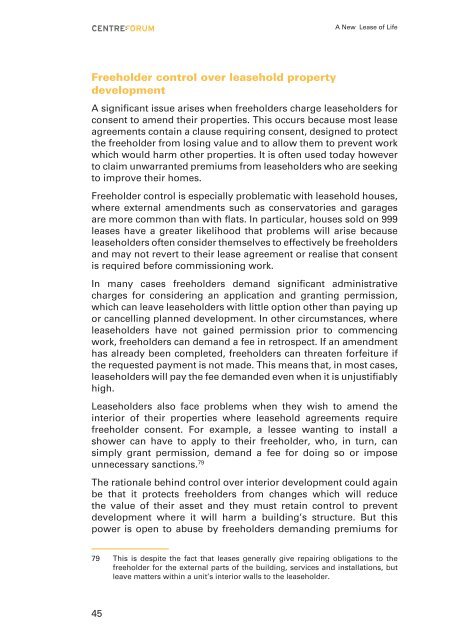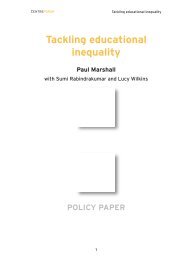A new lease of life: - CentreForum
A new lease of life: - CentreForum
A new lease of life: - CentreForum
Create successful ePaper yourself
Turn your PDF publications into a flip-book with our unique Google optimized e-Paper software.
A New Lease <strong>of</strong> LifeFreeholder control over <strong>lease</strong>hold propertydevelopmentA significant issue arises when freeholders charge <strong>lease</strong>holders forconsent to amend their properties. This occurs because most <strong>lease</strong>agreements contain a clause requiring consent, designed to protectthe freeholder from losing value and to allow them to prevent workwhich would harm other properties. It is <strong>of</strong>ten used today howeverto claim unwarranted premiums from <strong>lease</strong>holders who are seekingto improve their homes.Freeholder control is especially problematic with <strong>lease</strong>hold houses,where external amendments such as conservatories and garagesare more common than with flats. In particular, houses sold on 999<strong>lease</strong>s have a greater likelihood that problems will arise because<strong>lease</strong>holders <strong>of</strong>ten consider themselves to effectively be freeholdersand may not revert to their <strong>lease</strong> agreement or realise that consentis required before commissioning work.In many cases freeholders demand significant administrativecharges for considering an application and granting permission,which can leave <strong>lease</strong>holders with little option other than paying upor cancelling planned development. In other circumstances, where<strong>lease</strong>holders have not gained permission prior to commencingwork, freeholders can demand a fee in retrospect. If an amendmenthas already been completed, freeholders can threaten forfeiture ifthe requested payment is not made. This means that, in most cases,<strong>lease</strong>holders will pay the fee demanded even when it is unjustifiablyhigh.Leaseholders also face problems when they wish to amend theinterior <strong>of</strong> their properties where <strong>lease</strong>hold agreements requirefreeholder consent. For example, a lessee wanting to install ashower can have to apply to their freeholder, who, in turn, cansimply grant permission, demand a fee for doing so or imposeunnecessary sanctions. 79The rationale behind control over interior development could againbe that it protects freeholders from changes which will reducethe value <strong>of</strong> their asset and they must retain control to preventdevelopment where it will harm a building’s structure. But thispower is open to abuse by freeholders demanding premiums for79 This is despite the fact that <strong>lease</strong>s generally give repairing obligations to thefreeholder for the external parts <strong>of</strong> the building, services and installations, butleave matters within a unit’s interior walls to the <strong>lease</strong>holder.45





